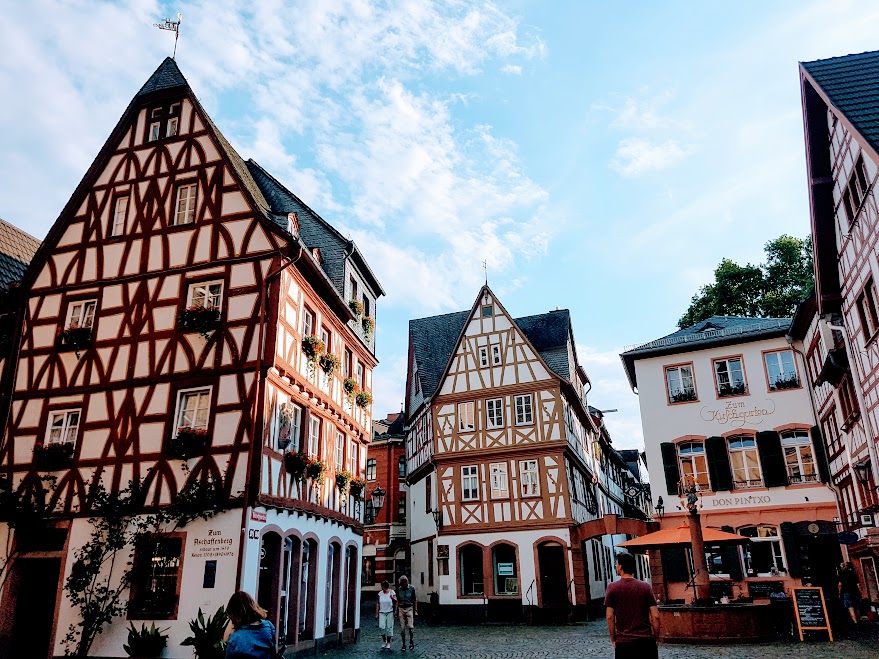Johannes Gutenberg-Universität Mainz Summer School 2017
I recently returned from three weeks in Mainz, Germany at Johannes Gutenberg-Universität Mainz for their International German and Theology Summer School 2017. I heard about the summer school from my colleague who attended the summer school last year in 2016. He had a great experience and recommended the program. I was definitely able to confirm all of the great things he had to say about it! I would like to share a bit about the program and encourage others to look into attending as well.
Why Study German Language and Theology?
Why is it necessary to study German language and Theology? Well, I suppose if you are not pursuing a career in Theology, Biblical Studies, or other related field then it is not really necessary. However, if you are interested in learning German so that you can read the works of great German thinkers of history in their original language or if you would like to learn more about the history of German Theology, then this is the course for you. For those who are pursuing an academic career or vocation relating to Theology, Biblical Studies, ministry, or other related fields (Master’s and PhD students, researchers, ministers), I would say it is imperative to have at least some working knowledge of German language and especially of German Theology. If you are thinking about applying for a PhD in Biblical Studies, you will see that many schools and supervisors require some working knowledge of German (or French) in addition to Biblical languages.
Some family and friends were a bit curious as to why I was going to Germany to study. What does German have to do with the Bible? The answer might not seem readily apparent to most people, but it is actually quite simple: Nearly all of what we identify today as Protestant Christianity is indebted to German Theologians of the 16th century and after. Without turning this into a history lesson, suffice it to say that a figure named Martin Luther caused a bit of a stir in the Catholic Church in 16th century Germany (not to be confused with Martin Luther King Jr., another great protesting and aptly named person of history!). Luther and many other Christian Theologians spoke and wrote in German. A great deal of secondary literature relating to my research (and probably most people’s research in the fields of Biblical Studies or Theology) is in German and has not or likely will not be translated into English.
About the Mainz Summer School
There are other German summer school courses out there, but the one in Mainz is beneficial in that it combines German language with lectures on Theology. Furthermore, as a matriculated student I had access to their libraries and even class lectures. This was the third annual Summer School and so the previous years had slightly different schedules as is likely with the 2018 course. I believe the schedules have all been roughly similar, so this will give you an idea of what to expect in 2018. The Summer School is organized (fantastically!) under the direction of Prof. Dr. Ulrich Volp and Frau Rachel Friedrich with the cooperation of Zentrum für Wissenschaftliche Weiterbildung (ZWW) and Deutsch als Fremdsprache (DaF). Many of us were awarded funding by the Deutscher Akademischer Austauschdienst (DAAD). There were also partial funding (Grant) opportunities.
We began each day (Monday—Friday) in the morning with German translating. This lasted until lunchtime, but with a nice break in between. We worked on translating texts by Martin Luther, Friedrich Daniel Ernst Schleiermacher, Karl Barth, Dietrich Bonhoeffer, Martin Hengel, Johann Wolfgang von Goethe, Karl Holl, Friedrich Gogarten, Rudolf Bultmann, Jürgen Moltmann, and even Mainz faculty members Prof. Dr. Ruben Zimmermann and Prof. Dr. Volker Küster. Grammatical lessons were included during the translating sessions. It was quite rewarding to improve our language skills day by day and to read the works of these great thinkers in German.
After translating, we parted for lunch which lasts a couple of hours to allow for eating and good conversation or even any necessary errands. Aside from a variety of optional lectures we reconvened after lunch for an afternoon lecture, seminar, or workshop. These afternoon classes were usually modelled around the texts we had been translating that morning, which aided our understanding of the content and ideas contained therein. Sometimes I was focused so much on the grammar and syntax that I did not stop to think more deeply about what the author was saying. These afternoon classes helped me to better understand the views of these great thinkers.
We attended lectures by Prof. Dr. Ulrich Volp (Ecclesiastical History and History of Doctrine), Prof. Dr. Ruben Zimmermann (New Testament), Prof. Dr. Michael Roth (Systematic Theology), Prof. Dr. Volker Küster (Intercultural Theology), Prof. Dr. Wolfgang Zwickel (Biblical Archaeology), and Dr. Susanne Luther (New Testament). Their variety of specification and expertise made for a diverse program and provided wonderful lectures in areas of interest for everyone.
The course included [optional] Saturday excursions with partial tours (Frankfurt and Mainz). Not only did we get to improve our German and learn more about German Theology, we were able to experience Germany. Sundays were entirely open to rest, attend church services, or further explore. I joined some other students on day trips during free time and I was able to go to extraordinary places. Networking with others in my field was also a great benefit. I made many new friends, which was worth the trip alone! Well, that, plus eat some marvellous food!
Many of the students, including myself, noticed significant improvement in German apprehension as the course progressed and came to a conclusion. It was certainly a confidence booster! We received a beautiful certificate at the completion of our course during a generous farewell ceremony.
German (and) Theology Summer School 2018
The Evangelisch-Theologische Fakultät announced that they will be hosting the fourth annual German and Theology Summer School in 2018. If you are even remotely considering this program, I recommend applying early and reviewing any funding opportunities. Either way, the organization of the program, the expert instruction, the generous accommodation, the networking opportunities, and the experience of Germany are more than worth the cost and time of attending.
You can find more information at: http://www.patristik.de/Summerschool.html





Leave a Reply
Your email is safe with us.